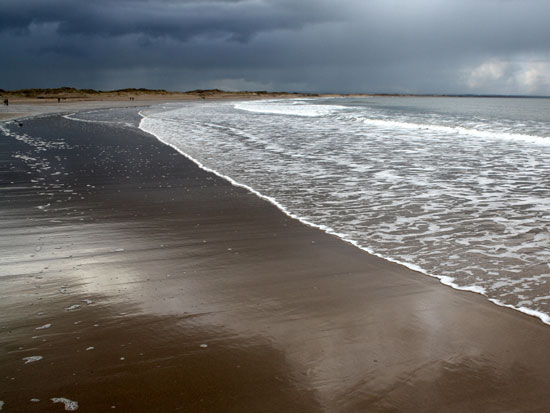While a lot of the focus on activism in recent months has been over the conflict with HS2, particularly given the level of violence which has sometimes been employed, campaigns to keep fossil fuels in the ground have been ongoing and with the industry itself facing a financial crisis, are pushing at something of an open door in places.
Various sites have been taken on recently, including during last months’ Extinction Rebellion protests, which alongside targeting the political and media establishment, kept the pressure up on Drax power station as it prepares to cease commercial coal-powered energy generation in 2021.
Coal
Plans to build the world’s biggest coal mine at Druridge Bay have been formally rejected as “environmentally unacceptable.” The government wrote in an official open letter to wannabe developers Banks Group that its plan to extract 2.8 million tonnes of coal would not provide enough benefit to outweigh its environmental impact.
The decision caps off a campaign by protectors to avoid development of the site, which was proposed in 2015 and initially accepted by Northumberland Council, and follows closures at nearby Brenkley Lane and Shotton. Banks Group intends to appeal, but with just one remaining opencast project left in the country and national plans to phase coal out for energy use by 2024 the opencast industry seems to be, at long last, on the way out.
Oil and gas
UK Oil and Gas remains bogged down over its various drilling projects.
Surrey Council’s decision to allow drilling on four more UKOG wells at Horse Hill is currently being challenged in court by Sarah Finch of Weald Action Group, on the grounds the council has failed to consider gas emissions. The group is now fundraising for her challenge, which has been estimated at £35,000, and is holding a related art auction next month.
Over on the Isle of Wight meanwhile more than 2,200 people have registered their objections to UKOG’s oil and gas test-drilling plans at Arreton. The company has acquired a large license on the island but has also inspired the founding of Don’t Drill the Wight, and is already being beset by criticisms over the potential damage that could be done to the area’s status as a UNESCO Biosphere Reserve. The island is one of only seven places in Britain to have been awarded the designation for its role in species conservation.
The news is also bad for several other major firms. Perenco UK, the largest onshore oil driller in Britain, which saw losses of more than £113 million in 2019 and is unlikely to do much better in 2020, as prices remain stubbornly low following the March to May price crash, which saw crude drop from $63 down to $12. Prices this month have hovered between $37 and $40, still far below the $70+ mark which fuelled speculative a boom in speculative onshore drilling up to 2018-19.
Cuadrilla, most famous for its now aborted attempt to drill for shale in Lancashire, has warned that this year will see investors scramble for the exit, though it continues to lobby the government in an effort to get it to lift a moratorium on shale imposed in 2019. The prospects look dim for now, as low oil prices generally make the expensive shale extraction process uneconomic as well as unpopular.
Hurricane Energy has had bad news for its investors as well, as its holdings in The Shetland Isles, the so-called Lancaster field, are now expected to produce a mere 36 million barrels of oil. Which sounds a lot, especially alongside its adjacent Lincoln field (64m) but compares to an initial figure of more than one billion barrels suggested in 2017. Further downsizing is likely, and the firm’s losses have expanded to £201m in the first half of the year.
Other firms however are pressing on with oil exploration efforts, including in North Kelsey, Lincolnshire, where Egdon Resources will be allowed to operate for the next 16 months after it won an extension to its licence for the second time. The original permission was granted by Lincolnshire County Council in 2014, but work is yet to be carried out.
And in Balcombe, Sussex, Angus Energy has prepared fresh plans for well testing at Lower Stumble after its previous application was rejected last year. The council had noted that there were no exceptional circumstances justifying such large works in the Area of Natural Beauty, and the new application merely seems to suggest the exploratory drilling phase will be shorter.
Pic: Druridge Bay seems to have been saved from coal extraction.



